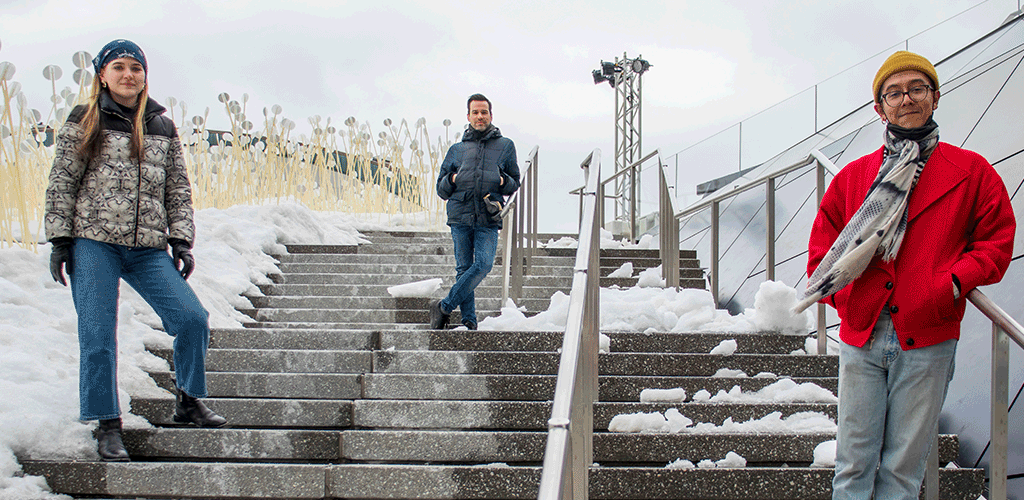Mauricio Herrerabarría and Uliana Poryvay
«"Homebound: Winter in Panama, Summer in Russia"»
DEC in Arts, Literature and Communication – LaSalle College Montréal

What was your main inspiration for this project?
Mauricio: When we first started brainstorming, we were asked what was on our mind. At the moment, I was reading about homesickness and the meaning of home – even what it is to miss home while being at home. This ended up materializing in Homebound: Winter in Panama, Summer in Russia.
Uliana: My inspiration was my own fate as an immigrant. The homesickness I face every day and the homesickness I see in the eyes of my friend Mauricio. The idea that we are from different places but equally miss our homelands was an inspiration for the project.
Can you describe your creative process?
Mauricio: To be honest, every walk around the city was research. At the early stages, the process of understanding our relationship with the urban topography proved itself necessary for further personal queries. Reading Jan Gehl’s Cities for People, Mark Kingwell’s Wish I Were Here, and David Berry’s On Nostalgia was very enriching, but it wasn’t until I finished Marixa Lasso’s Erased: The Untold History of the Panama Canal that I sharpened my senses and defined what I wanted to express with the project.
Uliana: A lot of planning. A lot of sleepless nights. Days of filming in one of the studios at the college with cameras, lighting equipment, reflectors, lots of microphones, backstage curtains, and we even tried shooting with a Go-Pro camera. Meetings with my partner and professor in the Old Port, Place des Arts, Mount Royal and many other Montréal spots. Interviews early in the morning or late at night because Siberia is in the opposite time zone.
If you could create this project again, what would you do differently?
Uliana: Mauricio and I are in agreement. We would focus even more on scheduling and priorities—what to spend time on and what not to waste time on. My parents always said to make a list of what is most important, to focus on those things, and I had a friend who said to just do something first and make it prettier later. These are both great pieces of advice that I now fully realize the wisdom of.
Has the school and/or your teachers helped you on this project?
Mauricio: If we were hobbits, our teacher Michael Belcher would be our Gandalf. We’ve been wonderfully guided throughout these months by his insight and feedback, from voice coaching to script-writing—some of the scenes in the film were also shot by him while we were in front of the camera, so I cannot think of this project without his aid.
Uliana: Michael Belcher was like a second partner and director at the same time. He not only helped us with small things but also with vast decisions. Our professor was present on all the many shooting days and helped Mauricio and me with everything. I am very grateful to him for the technical guidance, but even more for the moral support and inspiration he gave.
Your project has contributed to generating positive changes in your community, how do you perceive these changes?
Uliana: There is no doubt that our project makes a positive contribution to the Montréal community. We contribute to the development of communities of different cultures and their integration. Our project also raises the importance of formal education and continuous self-education. The main goal is to convey the message that all people are equal, and every culture is important.
The year 2020-2021 has brought its share of challenges. How have you adapted your ways to turn the difficulties encountered into opportunities?
Mauricio: By re-learning how to listen and be patient. This past year has given us the chance to catch up with life and take the time to enjoy the little things. We were sailing high tides and now that the tide is low, we can recognize the soil, rocks, and fossils that comprise who we are as humans. This sense of personal geology was pivotal in the making of Homebound: Winter in Panama, Summer in Russia.




